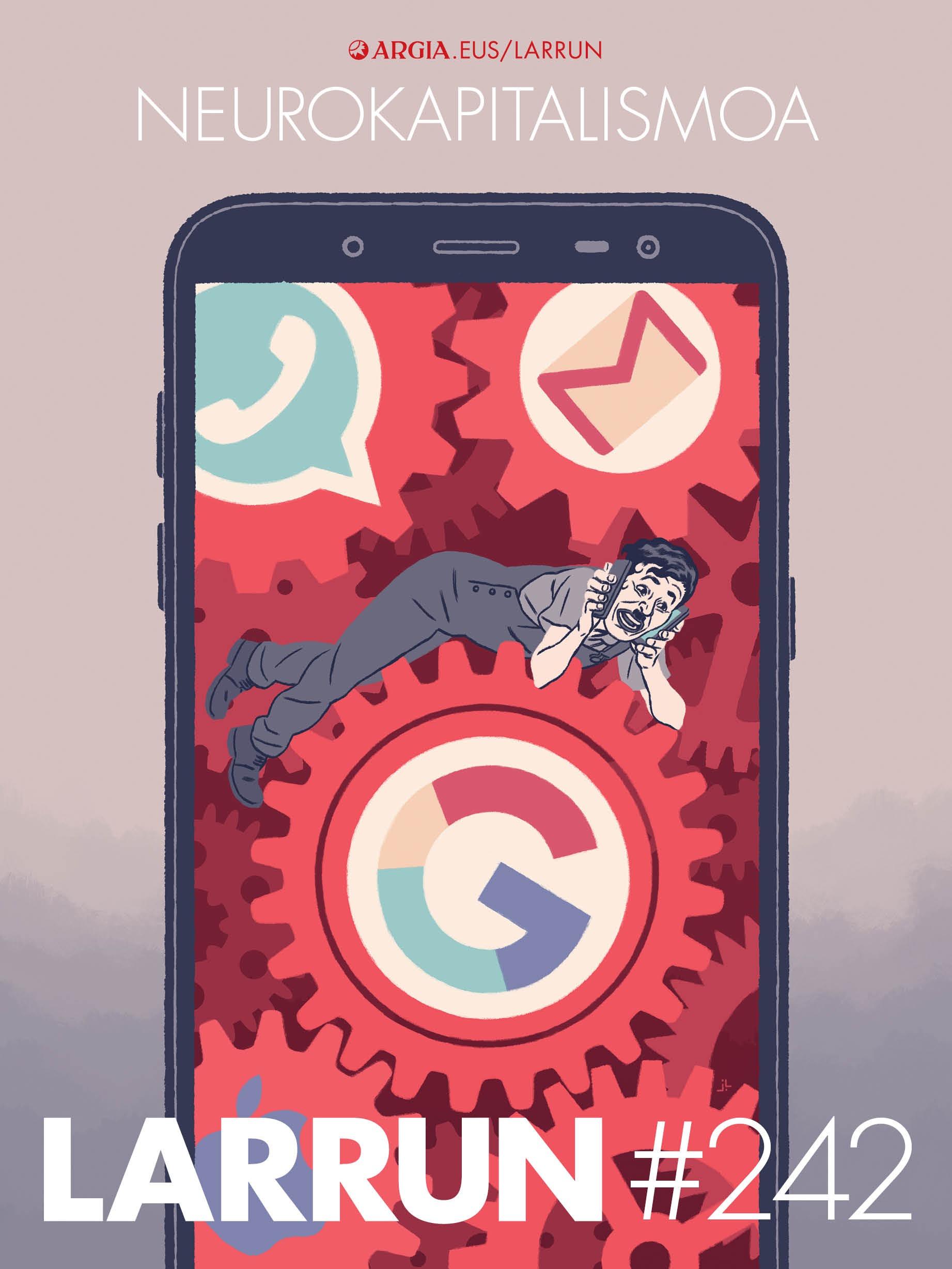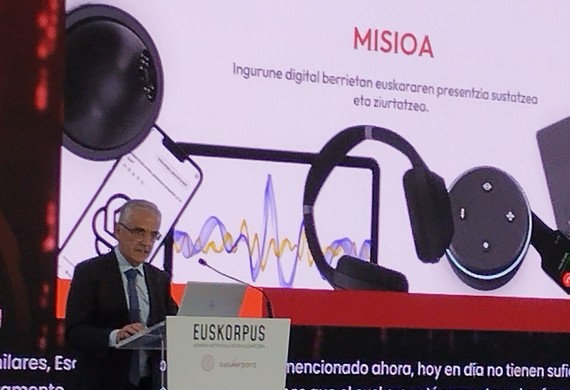Works, lives and consumes in the age of data and screens
- It's a productive model. The last mask capitalism has worn at this point in history. It is also an ideology that is constantly repeated in the universities, in the offices that advise companies, in the days on entrepreneurship and the creation of companies that are organized everywhere. And, above all, it is the mast that has been embraced by the authorities everywhere, in the hope that, after crossing the turbulent seas of the economy of the last decade, new Indies will appear. They've called it the "digital revolution." Also the Fourth Industrial Revolution. And it's curious because, to have a revolution, nobody feels freed from what it brings. Loneliness and radical individualism. And stress -- that is, more stress -- the lack of time, the need to be continuously connected, the polarization of emotions, the new cultural paradigms. Increased consumption. Increased consumption. It's not a revolution, it deserves another name: neurokapitalism.

It's not you, it's your workforce.
The Basque Government’s Minister for Employment and Social Policy, Beatriz Artolazabal, referred to the current situation. Bilbao, 8 May 2019: “With the digital revolution and the change in forms of production, opportunities will be created for young people who undertake and know how to detect new trends.” A somewhat boring appearance is the one they have organized to publicize the results of the Gaztenpresa de Laboral Kutxa Foundation last year. That entrepreneur lexicon of always. A second turn to the possibilities offered by the digital space to earn money in the pan, which all the costumes dedicated to the trends of the bussiness repeat in recent years, in this case in the mouth of a public office.
At least the counselor seems to have learned the lesson: In 2017, in an interview granted to Cadena Ser, he said that the payment of 600 euros per month guarantees a dignified life. And networks got angry, because the digital revolution has also done so. No wonder, given that the poverty threshold in Hego Euskal Herria is €1,059.30 per month according to Elkartzen. It is not surprising, above all, because it was later learned that the counsellor’s annual salary is EUR 87,000. But he has learned: since then he has not made any statement that was worth a single headline. It's not about drawing attention, because ideas are best inoculated through monotonous mantras. Among the topics of the School of Business repeating, the following phrase: “The entrepreneurship work developed by a young person not only serves to work for himself, but also serves as an opportunity for personal development.” Is the Basque Government not only concerned with job creation, but also with the “personal development” of the youth of Álava, Bizkaia and Gipuzkoa?
The economic
model that comes into force completely blurs the line that separated the workplace from people from their private lives.
The phrase does not cause a scandal, since a certain culture of work has a significant weight in this country, which reconciles this type of assertion with the way in which we have understood employment so far. But in the age of telephones connected to the network, we have to look more closely at the transformation that is being consumed at the intersection between work and personal life. And with a little magnifying glass, what Artolazabal says is more linked to the reorganization of the productive model that is being imposed from the hand of digital technologies, as well as to the speeches that have been disseminated to justify it. In fact, it seems that for the economic model currently being implemented it is not enough for workers to work. They also have to give a level in other areas. As explained by Lars Distelhorst in his article Bonbilla y Mudanza, the worker is also required to become a “better person”, jumping above a red line that until now was not exceeded: a line that differentiated the private space of a person from his field of work.
We are living a process that aims to mobilize the lives of people in their entirety for production, with a level of demand that we have not known in the previous productive models, since the industries of the last two centuries left more space for the differentiation of the person and their workforce.
What is this difference? As Karl Marx explains, no one can sell his work, what he sells is his ability to work. It is this capacity that is transformed into merchandise, like anything else that can be marketed, with one part, that has the capacity to produce surplus value, so it is possible to put a price on it, and, consistent with the subject to be discussed, clearly define what is the labour force marketed and what is not. In developed countries, however, it is becoming difficult to distinguish which abilities of a person are appropriate to sell in the labour market and which, on the contrary, are those related to the private sector, those related to the social environment of that person and the relationships that do not seek economic benefits. For the digital production system that is being implemented everything is useful, everything can be exploited. And as a result, there is a risk that the person as a whole will become a workforce.
The dystopian film The Matrix of 1999 predicted a world ruled by machines in which humans were no more than a source of energy, batteries. The Wachowski sisters' film predicted the nightmare of a humanity immersed in virtual lives, when the Internet was still something new for most citizens. Although the dark prophecy of the film has not been fully fulfilled – for the time being – technological changes from the first mechanical loom of the late 18th century to the first iPhone that was launched into the market in 2007 have greatly altered the conditions of exploitation of workers, shaping societies at every moment. In the nineteenth century, the model of mechanized production, for example, allowed to reach figures impossible to produce by the mere force of living beings. But that was not the beginning of an era of prosperity for the whole world, but a new form of oppression of the majority of people: industrial capitalism, in which people were forced to work in endless days, following the repetitive rhythm of the machines, to receive in return a reduced wage – perhaps the film of Charles Chaplin Modern Times (1936) better reflected the prediction of that model of forstful production another one.
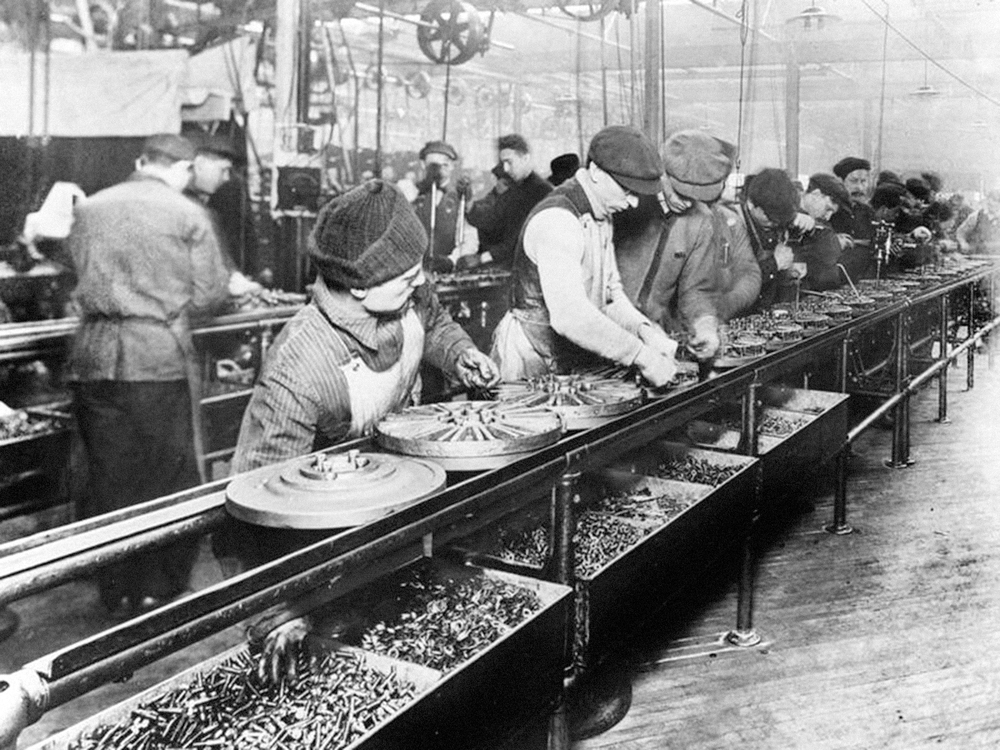
The two world wars and the grave economic crisis known so far, plus the development of socialist models in several countries, will bring a new division of cards as the twentieth century progresses and in countries where the capitalist model is more advanced, the working masses will become masses of consumers. Moving from the old industrial society to the new consumer society, there will also be a fundamental change in the product production process. From that moment on, the owners of the means of production are not only going to require the worker to sell his physical labor force, but they are going to show more and more curiosity about what happens in his mind: what he wants to buy, what needs, why. This change is fundamental to understanding the neurocapitalism that is now fully expanding.
Produce your consumer profile
Researcher Giorgio Griziotti presents Neurocapitalism 2016. As explained by Mediazioni tecnológico iche e linee di leakage in his book, between the 1960s and early 1980s, the fordist model was brought to the crisis at the same time by the struggles of the historical subject worker and mass consumer. Capitalism will find in Japan the formula for reinventing itself: Toyotism. More automated assembly chains, demand tailor-made production, which reduces almost to zero storage costs through the just in time system, production of very different products in small quantities in the face of a fragmented market, contrary to the mass production of a single product driven by the fordist model, and, as for the role of workers, unknown mobility, which together with the implementation of this model will become “flexibility” for business owners.
The new factory demands a worker who can perform multiple different functions, today and tomorrow capable of doing so; and this type of workers is hired one by one, not en masse, making the composition of the workforce more heterogeneous than before; and weakening the collective factor in the relations between workers.
In addition, Chaplin’s “modern times” are over. There are still machines in factories, but as we move towards the end of the 20th century, workers go through mechanical tools to work with information processors. As Griziotti points out, change is not foolproof, as the software requires the interaction of the operator. A forced interaction, which can sometimes be exciting, but at other times is irritating. The relationship of the worker with the previous machines is more complex.
The era of cognitive production comes along, and to understand the difference with previous productive models, you have to make a 180 degree perspective shift.
As operators get used to these tools, the Entreprise Resource Planning (ERP) era comes in the offices: everything is integrated and planned from the company's brain, both the automated production mechanics and the cognitive work of workers in the manufacturing process, which can now be recorded thanks to the computer tools, for further analysis, immersing the entire production process in the continuous control. The company develops a nervous system that thoroughly exploits the mental work of the people in charge to achieve the greatest possible benefits.
And once you start to take advantage of cognitive work within the company, it's going to be just a matter of time the temptation to do something similar in places other than workplaces. In short, if the data generated by hundreds or thousands of workers adjust production and multiplies profits, if everyone is engaged in data production, corporations throughout history will be able to know more exactly what to sell, when to sell or to whom to sell.
On the way, the figure of the mass consumer is going to be broken. And shit is also the wall that separates the producer from the consumer: the era of cognitive production has come and if we compare it with the previous phase, it is necessary to change the perspective of 180 degrees so that the new rules of the game are understood. Now the aim is to activate the consumer, and to do so, digital tools are a fundamental tool. Through supposedly free services, each person becomes, consciously or unconsciously, a producer of his own consumer subjectivity. And it leaves traces everywhere: what it does, where it is, what it interests it, what it does not, what it moves its emotions… It is a consumer, yes, but a consumer who constantly changes through the data it produces. A consumer who is also a productive force. A “prosumer” that moves constantly stimulating cafes to take them, repeatedly changing relationships, taste and employment.
The special position of this subject may explain, perhaps, why we keep a mobile phone connected to the network, even though since 2013 we have known the espionage carried out around the world thanks to the information disseminated by Edward Snowden, a former colleague of the CIA and the NSA. Why do we constantly connect to the internet without taking special privacy measures, allowing big tech companies, in addition to the U.S. intelligence services? Look at our lives. We live in hyper-individualized societies and the social tissues that we would need to influence collectively are becoming increasingly worn out; we have less and less room to make free decisions on key issues, where to live, if the right to housing is not guaranteed? What is it to work on, in an economic model that for the majority only offers unemployment or precariousness?–; in view of all the freedoms we are losing, the possibilities of consumption are the only ones in the proliferation phase. And we don't want to give up those opportunities, because they're the means we have to shape our fragile individualities.
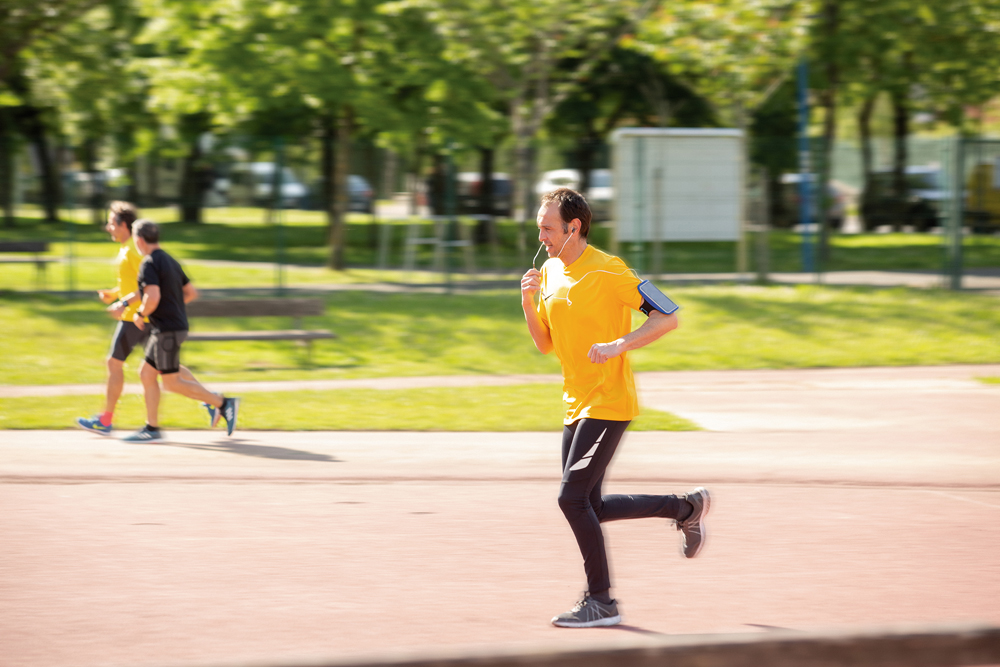
We have integrated the screens and the “free” market
There are also other reasons for explaining the immediate attachment that everyone has felt to screens. All smart mobile phones, tablets and other similar clips are designed to properly integrate the new economic model into the constant movement of the human being. Unlike the computer, which is becoming faster and more portable, you can always have your phone near the body and turn it into a digital broadcast of your physical being. The rational aspect of our digital identity still prevails in the computer. Emotions have more space on the phone, because it's available at any time in life, as much or more than at home. The possibility of being connected to the global network at all times has already entailed a profound anthropological transformation that probably has not been reversed. The transformation is universal, as mobile telephony has reached almost all parts of the world at once. And it's generated another concept of attention, the time to address something that has become a scarce commodity in the era of overproduction of cognitive stimuli. The social space has also been completely compressed into the screen world: as spontaneous communication with anyone anywhere has normalized, the concept of closeness that has been established so far must be seen with other glasses, asking if we are experiencing a process of de-territorialization, and what can endure from the relationships and production models that we had before.
We say we're surrounded by screens. Maybe, to explain what we live, it's more accurate to say that we have screens embedded in bodies. I mean, technology is no longer just a medium, it's something that's out there; it's broken the walls that we thought were untouchable, it's become living matter. It is called “Biohypermedia”, the new everyday life that the body shapes with hypertexts and other digital media.
This paradigm shift has not been built on the void, but on the ground marked by neoliberal capitalism. This may explain why there are companies that are expanding in recent decades. The new digital industries have been conceived under the premise of free market fundamentalism, based on an almost total lack of regulation and understanding as obsolete postcards some of the guarantees that the previous production model offered to workers – stable contracts, determined working hours…. Instead, it highlights the freedom to work “without hierarchy” to whom the new workforce puts. And he's sold a dream: that someday he'll be the creator of a startup that will succeed, that will get rich and that will be able to count from the top of his career, as Bill Gates or Steve Jobs said, that everything started in his home garage, starting with a great idea.
But the fate of the majority is the multiplication of exploitation conditions. Non-adherence to a hierarchy can be understood as freedom if other demands are not taken into account, such as those of banks, customers and tax collectors. It is possible that the control that the head of the company established in the fordist factory has disappeared or been reduced in the model that is currently being imposed, even in companies with vertical organization, the spirit of the time requires “friendly” managers, energetic and healthy entrepreneurs who motivate the workers, which does not mean that productive relations have changed, but that the ways to achieve the cooperation of the workers are now different.
The new model loves “flexible” works without hierarchy. But the fact that there are no bosses on top does not mean that we are free, but that we are directly under market pressure.
For the rest, everything remains the same. Or worse: there is no limit on working hours and the result is a very low wage. Because we don't differentiate when we're employees, when we're consumers and citizens, we basically do everything as if we're working, putting performance at the center. Not only the screens, we have also integrated the free market into our subjectivity and based on it social, political and economic relations are established, as well as individual behaviors. From the moment this logic is imposed, the threat of the factory head can disappear, as it is no longer necessary. As Felix Klopotek points out in the aforementioned book The Society of Performance (The Society of Performance, Katakrak, 2018), in the hierarchical company the worker still has the possibility to create spaces of freedom, doing less work with tricks and charging the same to make ends meet. “These spaces of freedom disappear where the borders are blurred and where there is no hierarchy, one is directly before the god – that is, before the violence of profit.”

trabajando.El neurocapitalism sees timetables and stable contracts as outdated postcards (photo: Juan Mari Aburto (White) .Dani Blanco)
The implications of the model are worrying: since there is no direct external control, the digital production system encourages workers to be productive through market pressure in the “environment”, which hinders the creation of spaces of autonomy for those forced to sell labor. It's as difficult as recognizing what's autonomous and heteronomous. Less and less orders, production plans, concrete working days are being heard. You have to organize yourself. Set goals. And immersed in this lack of definition, there is also the moral burden: “I don’t do enough.” This psychological burden is one of the characteristics of the new precarious generation, which complements the lack of time and fragmented vital trajectories.
The world becomes an interface
The effects of neurocapitalism are also perceived beyond the labor world. Some of them have been analyzed by Ingrid Guardiola in the essay L’ull i la navalla (The eye and the knife, Arcàdia, 2018). Among other things, he has analyzed the transformations undergone by the images, spaces and times in today’s world in a book that has recently been awarded the Serra d’Or Prize. According to Guardiola, we have gone from a biological and chronological time to a chronoscopic time: a time marked by the hours we spend in front of screens and a world in which concepts such as interface, virtuality or tele-reality have jumped from screens to the physical world.
We no longer work with the world, but with a virtual copy of it, says the researcher of Girona in a passage of his book. Everything has become an interface, starting with our own bodies: every young athlete shows their abs grown on Instagram or Tinder and the number of people you can see through these platforms is far greater than what you can physically relate to them. Relationships occur on a new scale. And in a different quality: in the dichotomy yes/no summarizes what can be said to a person through the screens: I like/don't like; I stay with the photo/scroll down. And that last gesture that everyone makes on their device expresses contempt for people like us who see on the screen.
Disdain, indifference, lack of interest… the most common gesture is to scroll to most of the things we see on the phone. As if we were new hunter-gatherers, we are looking for stimulant cognitive foods, although we don’t know very well what we want – because today the effort is not just to achieve what we want, but also to know what we want, because of the hyper-supply. In this search, the excess draws our attention: expressions outside the tone of a politician, images that generate impact, things that enrage us. Networks are also tools for provoking concrete emotional situations, because every time we react to something we see in them, the machinery of psychic capitalism is activated. And it's been shown that negative feelings generate more clicks and, therefore, more data. “Are we already immersed in a posthumanism in which algorithms, desires and affections are completely connected?” asks Griziotti in the book we have mentioned earlier. “And if so, what ethics emerges from there?”
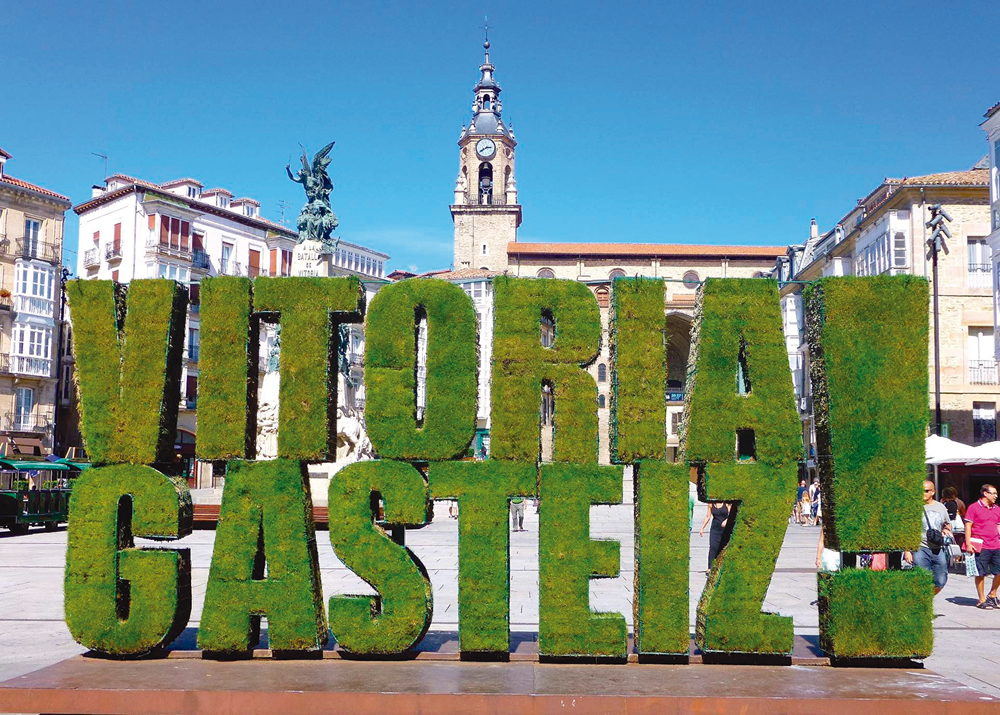
It's not just a productive model. They're not just tools and applications that encourage us to create virtualized social relationships or data: neurocapitalism has transformed the places we live in. Cities are becoming a dynamic interface to facilitate the navigation of tourism practitioners. A sample of this can be the plant name of the city located in the Plaza de la Virgen Blanca of Vitoria-Gasteiz: This intervention to make the “Gasteiz brand” visible is hardly understood as a desperate attempt to become identifiable in times of hyper-production of images – an invention that Donostia and Bilbao imitated running, without completing the name of the city with the plants, yes.
The virtualization of spaces has other implications: Platforms like AirBnb make housing not material goods but places to live experiences. Reach out, use, give in. And in this way, you can't build a solid narrative about that place, like houses that have relatively stable tenants. The places we inhabit also go the same way, as Guardiola stresses in a very simple way: the room itself, which until recently was a personal refuge, has become a hunting zone of the self: “The camera is immobile, like an eye too impressed to blink, while the subject shows his room and his intimacy with the rhetoric of the monologues he tells the camera. The classroom and the subject, space and self share a virtual story. Intimacy becomes a staging, a fake.” And, therefore, there is little space left to be each one with himself.
What do we do about this techno-economic model that reaches the last end of our lives? The first step is to become aware of the situation: we need to know the risks we have when we stop being people to become “prosumers” or voyeur.Debemos realize that we are taking all the time we spend in front of screens, to think, to be together and to start common projects. And we must be aware of the limitations that digital tools present in the framework of current productive relationships: In the network where FAANG companies dominate, almost all of us work for free, consciously or not, and in doing so we give these private companies the power to organize our lives, because by analyzing and classifying all the data we provide to them, the world population has become more manageable than ever before.
The only option is to disconnect? Or if we had a more critical attitude towards the technologies we use, would we do things differently? Perhaps we have to recover the initial spirit of the Internet: to return to a digital continent that gave prosperity to the whole world, where new opportunities were offered to share free elkatruke and personal know-hows before the exploitation logic of the multinationals extended so much. That Internet of communities allowed us to imagine a world based on collaboration, rather than money and viral fame.
Smartphone-a
Dudarik gabe, neurokapitalismoaren hedapenean gehien lagundu duen tresna da. 2000. hamarkadaren amaieran sarera konektatutako telefono mugikorren erabilera ugaritzen hasi zenetik, ordura arte ezagutzen zen mundua goitik behera aldatzen hasi zen. Distiratsuak, edonora eramateko modukoak, edozein unetan erabiltzeko prest: tresna izugarri adiktiboak dira. Mundu guztian, klase, arraza, sexu, hizkuntza edo nazionalitateen gainetik telefono adimendunak bere legea inposatu du. Ia mundu guztiak dauka bat. Ia edozertarako erabiltzen da. Ia inork ez du gaur egungo bizimodua irudikatzen hura gabe.
Eramateko kafea
Kapitalismo psikikoak etengabe mugitzen diren langileak eskatzen ditu. Lan-jardunaldi amaiezinei bizirauteko gaitasuna daukaten langileak, uneoro esna, bizi eta sortzaile. Kafea da bizi-estilo horretan falta ezin den oinarrizko droga. Baina ez fin de siècle-ko tertulia paristarretan patxadaz hartzen zen kikarako kafe hori, langileak berarekin batera garraiatu dezakeena baizik. Kartoizko edalontzi batean edatea beste erremediorik ez dagoen kafe bat, hasieran beti beroegi dagoena, plastiko baten zulotxotik edan behar dena. Mendetan gizateriak garatu duen kafearen kultura pikutara bidaltzen duen kafea. Zer inporta du: cool da.
Selfie-a
Begira, ni naiz. Hemen. Eta hor. Eta han ere bai. Ni, nerau, neroni. Pozik nago, aurpegi arraroa jartzen dut. Hemen oporretan. Hemen lagunekin. Hemen betaurreko berriekin –ez dut jarriko zein markakoak diren zeren, oraindik ez didate horregatik pagatzen; pazientzia, etorriko da–. 2010eko hamarkadatik aurrera bihurtu ziren ohikoak auto-argazkiak egiteko aukera ematen zuten kamerak telefono mugikorretan. Eta sare sozialekin konbinatuta, irudiaren kultura aldatu dute. Adin batetik gorakoentzat exhibizionismo-ariketa hutsala da. Gazte asko eta askorentzat, munduan presentzia edukitzeko oinarrizko irudi-mota.
Gorputz birtualizatua
Tatuajeak. Ile tindatuak. Gimnasio-ordu askoren ondoren markatutako giharrak. Piercing berria. Gorputzak norberaren borondatez jasan duen edozein aldaketa eskaparate digitaletan erakusten da. Etekina atera behar zaiolako: ehunka bihotz Instagramen, zoramena Tinderreko harmailetan. Baina gorputza, organismo bizidun hori, zerbait birtuala bihurtzen da argazkien filtroetatik pasatzean eta fisikoki inoiz ezagutzera iritsiko ez garen pertsonen begietan. Ezarritako kanonen antza eduki behar duen avatar bat. Gorputza, organismo bizidun hori, zahartzen eta kanon horietatik urruntzen tematzen da. Eta gaitzerdi.
Telebistako plato bat logelan
Atzean agertuko dena dekoratzen lan handirik hartu gabe, youtuberra kameraren aurrean jarri da bere milioika jarraitzaileen aurrean hitz egiteko. Lehen ezinezkoa zen hau: publiko hain masiboetara iristeko ikus-entzunezko produkzio oso garestiak behar ziren, ikusgarria izango zen programa batek artifizio asko eskatzen zuen. Orain ez: webcam bat eta gain-antzezpen pila bat aski dira telebista konbentzionalak baino ikusle gehiago harrapatzeko. Ez dago gaizki: telezaborrak alfer-alferrik zenbat diru irensten duen frogatzen du enpirikoki. Baina, bestetik, edozein etxetako logela bihurtu da orain telezaborra ekoizteko plato bat.
Nortasuna Sarean jardunaldien 10. edizioa egingo dute asteazken honetan Donostiako San Telmon, KomunikaziONA bideguruatzean izenburupean. Egungo komunikazio joerak aztertu eta "alternatiba osasuntsuagoak" topatzen saiatuko dira. Hainbat hizlari gonbidatu dituzte, euren... [+]
Orain dela 20 bat urte, berrikuntzaren inguruan master bat egin nuen. Bertaraturiko gonbidatu batek esan zigun gizakion historian berrikuntza teknologikoaren eragile handiena gerra izan zela. Gerra, halaber, eragile handia da botere harremanen berrikuntzan.
Berrikuntzaz ari... [+]
Aspaldi pertsona oso zatar bat ezagutu nuen, urrun izatea komeni den pertsona horietako bat. Bere genero bereko pertsonengana zuzentzeko, gizonezkoengana, “bro” hitza erabili ohi zuen. Edozein zapaltzeko prest zegoen, bere helburuak lortzeko. Garai hartatik hitz... [+]
Sare sozialetan badira zenbait pertsona eragin gaitasun handikoak. Jarraitzaile ugari dute, eta euren iritziak egiatzat hartzen dira. Askok, ordea, egia barik, interes propioa edo klase baten interesak iraunkortzea bilatzen dute. Ameriketan komentokrata deitzen zaie. Alegia,... [+]
Ortutik itzuli berritan erabaki nuen Twitterretik alde egitea, oraindik Twitter zenean. Auzolan batera joan nintzen, brokoliak eta azaloreak landatzera, eta mindfulness efektua zapuztu zidan algoritmoak, idazle feminista transgorrotatzaile baten txioak jaurtitzearekin... [+]
Iragana ulertzen saiatzen eta etorkizuna bideratzen, oraina joaten zaigu zenbaiti. Nire proiektuetako bat (hasi baina landu ez dudana oraindik) dudan zuhaitz genealogikoa egitea da. Horretan lagunduko didan liburutxo bat ere erosi nuen. Baina, hain da handia lana, liburutxoa... [+]
Ikerketa bat egin dute Alemanian, hauteskundeen atarian: kontuak sortu dituzte TikToken, X-n eta Instagramen, eta aztertu egin dute algoritmoak zer nolako edukiak erakusten dituen. Guztietan, algoritmoak eskuinera eta eskuin muturrera jotzen du gehien, TikToken nabarmen.
Euskorpora elkartearen eta Euskorpus proiektuaren abiatzeak hautsak harrotu ditu. Pello Otxandiano EH Bilduko Eusko Legebiltzarreko oposizio buruak Euskorpusena akatsa dela uste du, "ezjakintasuna edo estrategia klientelarra". EH Bilduk galdera sorta egin du... [+]
There are many ways to gain power; not all are beautiful. There are those who want to divide the power and the responsibility that it entails with it, who seek authority. Others have a lot of respect for him and the fact that each step is so measured makes them unable to make a... [+]
From the Association of Parents of the Instituto Arratia Small Tram we want to encourage reflection on the use of screens in the learning community.
Lately there is a lot of concern about the impact of screens on children and adolescents. This responsibility extends from... [+]
Azken boladan gero eta gehiago entzuten dugu gazte askok etxebizitza erosteko ahalmenik ez dugula. Batzuetan, badirudi ez dagoela beste gairik; egia da gai serioa dela. Niri neuri ere, 31 gertu izan arren, oraindik pixka bat falta zait neurea izango den etxebizitza lortzeko... [+]









